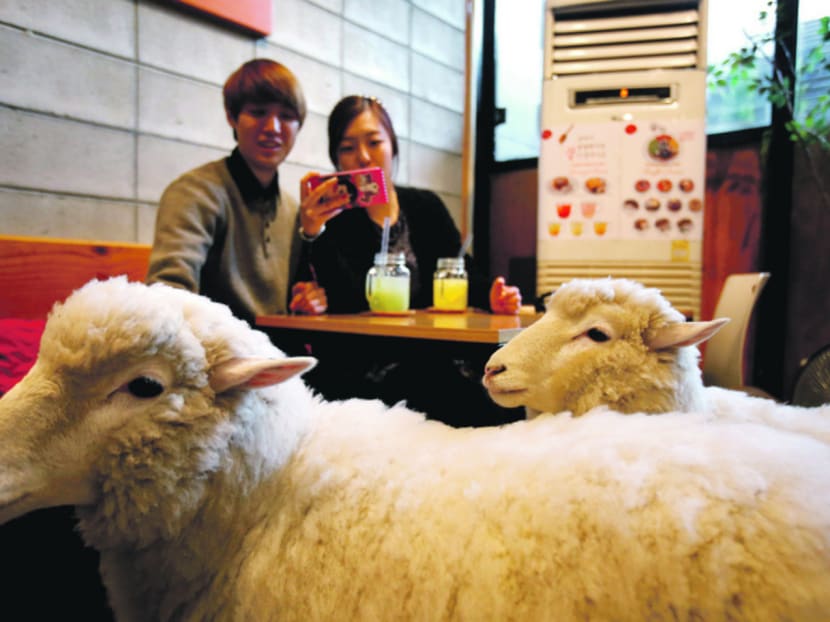China’s tourists head for Japan, S Korea, Russia
BEIJING — China’s masses of globetrotting tourists are changing their habits amid currency shifts, evolving fashions and upheavals in everything from politics to visa policies — with Japan, South Korea and Russia among the biggest beneficiaries.

A Chinese tourist taking photographs of sheep at a sheep cafe in Seoul last year. Travel experts said Chinese are now travelling for experiences, not only for shopping. Photo: Reuters
BEIJING — China’s masses of globetrotting tourists are changing their habits amid currency shifts, evolving fashions and upheavals in everything from politics to visa policies — with Japan, South Korea and Russia among the biggest beneficiaries.
Despite historical enmity and persistent political tensions between Beijing and Tokyo, the number of mainland Chinese tourists visiting Japan jumped to 359,000 last month, a year-on-year rise of almost 160 per cent, said the Japan National Tourism Organisation.
Mainlanders’ visits to South Korea also soared, up 58 per cent to 516,787 last month against the year before, said the Korea Tourism Organisation.
Meanwhile, China overtook Germany last year as the biggest source of foreign tourism to Russia with almost 410,000 visits, said Rostourism.
“Currency is a big factor in choosing destinations, since Chinese tourists still do a lot of shopping while travelling and they are very price-sensitive,” said Mr Dai Bing, head of the China Tourism Academy in Beijing. “Trips to Japan and Europe have been boosted by their weak currency. We have also noticed a significant growth in tourist numbers to Russia because of currency depreciation.”
Last year, the number of outbound tourist departures from mainland China hit 100 million for the first time, said state media.
But almost half of that figure is accounted for by Hong Kong. Visits to the Chinese territory rose 16 per cent last year to 47 million, despite street protests in September and October, but began to decline during February’s Lunar New Year holiday and fell even more steeply this month as anti-mainland sentiment grew, said the Shanghai Daily.
In recent weeks, scuffles have broken out between Hong Kong residents and day-tripping mainland traders who buy goods in the city to sell over the border.
But if fewer mainlanders are heading to Hong Kong to buy everything from milk powder to handbags, the numbers going further afield to shop have risen sharply — and they are coming home with a whole new range of products, from Japanese toilet seats and rice cookers to Korean skin cleansers and hydration creams.
“Chinese tourists now shop for a broader range of products, not only luxury goods, but daily necessities”, said Mr Dai. “They no longer buy things to show off their wealth, but things that they really need and are worth the price.”
He added that Hong Kong has lost its advantage over other destinations, and not only because of political tensions or hostility from the locals. “Almost all the middle-class mainlanders who have the money to visit Hong Kong have done so, while visa policies in other countries have been relaxed for mainlanders,” he says. “The tourism competitiveness of Hong Kong has been weakened.”
Travel experts said Chinese are now travelling for experiences, not only for shopping. Ctrip, the Chinese online travel agent, said twice as many mainlanders will visit Japan for the spring cherry blossom season this year as last, while Australia’s largest provider of camping vans said Chinese rentals have doubled over the past year.
Cultural trends are also playing an increasing role in travel choices — particularly in the growing allure of South Korea.
Ms Choi Kyung-un, a researcher with the Korea Culture and Tourism Institute, said Chinese purchases in the country are driven by trends derived from Korean television, movies and K-pop music. “Chinese people have become more interested in South Korean culture — and the country itself,” she said. Visa procedures have also been simplified. THE FINANCIAL TIMES






